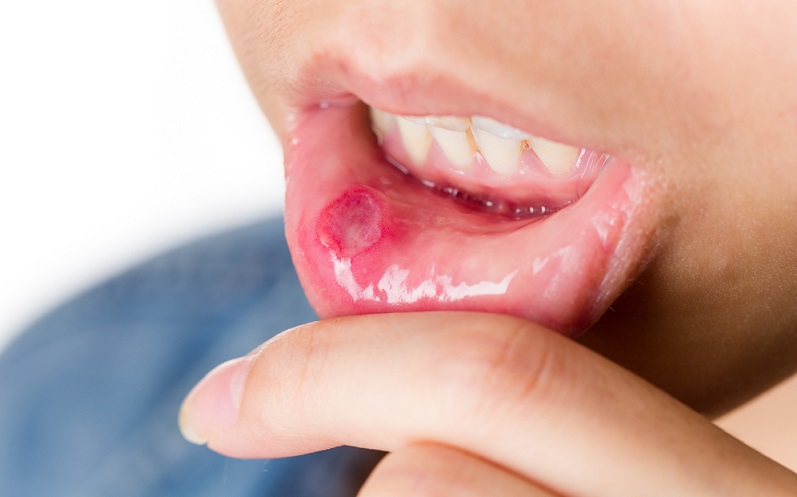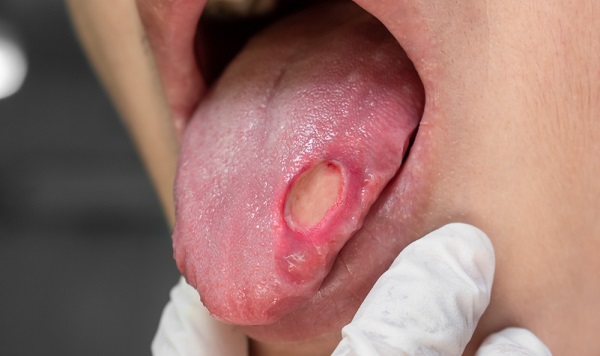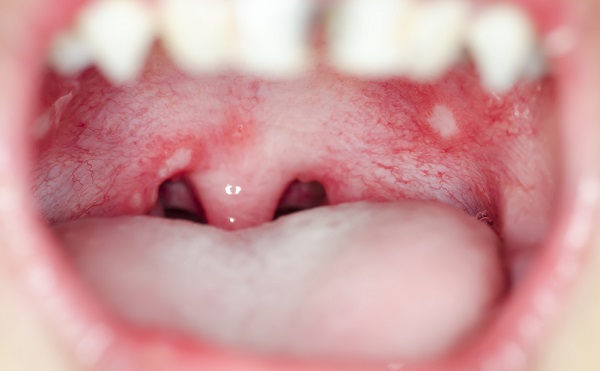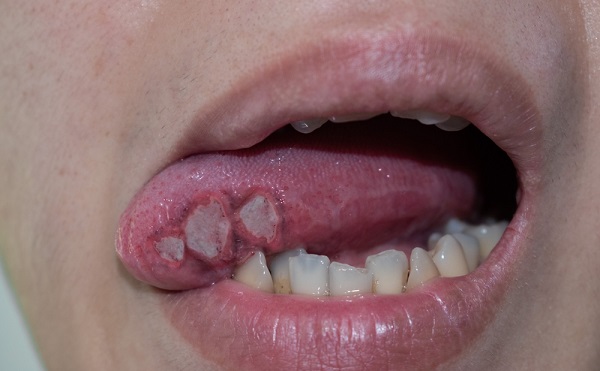Canker (Mouth) Sores: Symptoms, Causes, Pictures and Treatment
Contents
- Introduction
- Prevalence and Incidence
- Canker Sore Symptoms
- Herpetiform canker sores:
- Pain or discomfort:
- Swelling or inflammation:
- Difficulty eating or drinking:
- Lesions:
- Recurrence:
- Causes of Canker Sores
- How to Differentiate Canker Sores from Other Mouth Sores?
- Canker Sore Pictures
- Tips to Prevent Canker Sores:
- How to Recognize Canker Sores Visually?
- Shallow, Minor Bump Within the Mouth.
- Tenderness of the spot.
- A Red Border may surround the sore.
- A cluster of canker sores can also appear.
- Common Locations in the Mouth
- 1. Minor canker sores:
- 2. Major canker sores:
- 3. Herpetiform canker sores:
- Canker Sore Treatment
- Prevention of Canker Sores
- Conclusion
Are you familiar with the sudden onset of painful mouth sores that seem to come out of nowhere? These pesky little buggers are known as canker sores and they can be a real pain (literally).
Understanding what causes these annoying nuisances, as well as how to recognize their symptoms, is crucial for effective treatment.

In this post, we will dive deep into the world of canker sores and provide you with all the information you need to know to kick them to the curb. So grab your favourite beverage and let's get started!
Introduction
Canker sores are small, painful ulcers that can occur inside your mouth. They’re usually white or yellow and have a red border.
Canker sores can make eating and talking uncomfortable. In some cases, they can also cause bad breath.
Most canker sores heal on their own within two weeks. However, some people may experience recurrent bouts of canker sores.
If you have frequent or severe episodes, you may need to see a doctor for treatment.
Prevalence and Incidence
Canker sores are one of the most common mouth ailments, affecting an estimated 20% of the population. They are more common in women than men and usually occur between the ages of 10 and 20.
However, they can occur at any age. Canker sores can be a nuisance, but they are not contagious and usually go away on their own within two weeks.
The exact cause of canker sores is unknown, but several factors may contribute to their development, including stress, spicy foods, acid reflux, certain medications (such as NSAIDs), deficiencies in certain vitamins (such as B12), and a weakened immune system.
While there is no cure for canker sores, there are treatments available to help relieve pain and speed healing.
These include over-the-counter medications such as topical creams or ointments, oral pain relievers, or prescription antibiotics if the sore is infected.
Canker Sore Symptoms
The majority of canker sores have a red border and a round or oval shape with a white or yellow centre.
They develop inside your mouth, either on your soft palate or on or under your tongue, inside your cheeks or lips, or at the base of your gums. A day or two before the sores really form, you might feel tingling or burning.
Canker sores come in a variety of sizes, including minor, large, and herpetiform lesions.
A canker sore, also known as an aphthous ulcer, is a painful, open sore in the mouth. Additionally, it is the most typical kind of oral ulcer.
Pain or discomfort: When eating, drinking, or talking, canker sores can produce a painful or burning sensation.
Redness, swelling, or inflammation may be visible in the vicinity of the sore.
Eating and drinking are difficult when there are severe canker sores, which can cause dehydration or malnutrition.
Canker sores can develop a single lesion, several lesions, or lesions of any size.
The majority of canker sores are minor, and:
- Are typically tiny, oval-shaped, and have a crimson edge.
- Healing takes one to two weeks without scars.
- Significant keratoses.
- Significant canker sores are less frequent, and
- Compared to mild canker sores, are bigger and deeper
- Are typically rounded with clearly defined borders, but when very large, they may have erratic edges.
- It might be really painful.
- May leave significant scars and take up to six weeks to heal.
Herpetiform canker sores:
Rare and typically appearing later in life, herpetiform canker sores are not brought on by a herpes virus infection. These keratocele:
- Are pinhead-sized.
- Frequently, they come in groups of 10 to 100 ulcers, but they can sometimes swell into one big ulcer.
- Have uneven edges.
- Canker sores can develop a single lesion, several lesions, or lesions of any size.
Pain or discomfort:
Canker sores can cause a painful or burning sensation, especially when eating, drinking, or talking.
Swelling or inflammation:
The area around the sore may appear red, swollen, or inflamed.
Difficulty eating or drinking:
Severe canker sores can make it difficult to eat or drink, leading to dehydration or malnutrition.
Lesions:
Canker sores can form single or multiple lesions that can be small or large in size.
Recurrence:
Some people may experience recurrent canker sores, with outbreaks happening multiple times a year.
While canker sores are not contagious, they can be uncomfortable and can make it difficult to eat, speak, or perform daily activities.
If you experience persistent or severe symptoms, it's important to consult your healthcare provider for proper diagnosis and treatment.
Causes of Canker Sores
There are a few known elements that are involved in the development of canker sores, including viral infection, but researchers have not yet offered a scientific explanation for why this happens.
There are ties between many factors, such as a family history, and recurrent episodes of canker sores, also known as recurrent oral aphthous ulcers or recurrent aphthous stomatitis. Allergic reactions and trusted source for aphthous ulcers.
Sometimes, medical factors like inflammatory bowel disease, weakened immunity, allergies, and dietary deficiencies are linked to ulcers.
According to a reliable source, the following elements play a role in the emergence of canker sores:
Hormonal adjustments.
Physical trauma (injury to the mouth's lining, such as occurs during dental work).
Drugs.
Citrus fruits and tomatoes, for example, can cause or aggravate a canker sore in people with food hypersensitivity.
nutritional deficits, such as those in the vitamins B12, folic acid, iron, and folic acid.
Stress.
According to a report by the US Surgeon General, up to 25% of the general population may suffer from recurrent canker sores; however, certain groups, such as students pursuing careers in the medical field, may experience greater rates.
How to Differentiate Canker Sores from Other Mouth Sores?
Canker sores and cold sores are related. Cold sores, on the other hand, can develop outside of the mouth, unlike canker sores.
Additionally, cold sores first manifest as blisters rather than inflammatory sores, and once the blisters break, the sores develop.
The herpes simplex virus is what causes cold sores. This virus is carried by your body and can be activated by various conditions, including fatigue, stress, and even sunburn. Your lips, nose, and eyes may also develop cold sores.
You can usually identify if a sore is a canker or a cold sore by where it is. Canker sores only develop inside the mouth, but cold sores frequently develop on the outside of the mouth around the lips.
HSV usually infects people when they are young. Children under the age of five may develop canker sore-like cold sores within their mouths after contracting a new HSV infection.
Canker Sore Pictures
1. canker sore on the tongue picture

2. Canker sore on the mouth pictures

3. Canker sore on the lips and tongue image

Tips to Prevent Canker Sores:
By staying away from items that may have in the past caused an outbreak of canker sores, you can stop them from happening again. These frequently consist of meals that are sour, salty, or acidic.
Avoid eating anything that makes you itch in your mouth, have a swollen tongue, or break out in hives.
Try relaxation techniques and stress-reduction measures, such as deep breathing and meditation, if a canker sore develops as a result of stress.
To prevent causing discomfort to your gums and soft tissue, maintain regular oral hygiene and use a soft toothbrush.
To find out if you have any specific vitamin or mineral deficiencies, consult your doctor. If you need certain supplements, they can recommend them and assist in creating a proper food plan.
In case you experience any of the following:
- Big sores,
- A painful breakout, and severe discomfort
- A severe headache,
- Rash,
- Diarrhoea, and high-temperature
If you are unable to eat or drink, or if your canker sore hasn't healed after three weeks, see a doctor.
How to Recognize Canker Sores Visually?
1. Shallow, Minor Bump Within the Mouth.
Canker sores typically have a diameter of less than 1 millimetre, while some have the potential to reach 12 to 1 inch. Major canker sores, which are deeper ulcerations, frequently have larger lesions.
An indication of a canker sore may potentially be a mouth lesion. Usually, these lesions don't develop outside of the mouth. Canker sores instead appear on the movable soft tissue in the mouth, such as the cheek's interior or the mouth's floor.
2. Tenderness of the spot.
Even though canker sores are small, they can be extremely uncomfortable, to the point that you might even feel one before you see it.
A tingling or burning feeling that may encourage you to gnaw on the lump is one of the early warning symptoms. However, you will only aggravate a canker sore if you chew on it or pick at it. Even gently caressing the area with your tongue will aggravate it.
Minor sores often provide mild pain, however, severe sores can cause excruciating pain.
3. A Red Border may surround the sore.
Additionally, a canker sore can be recognised by its colour. These lesions are occasionally surrounded by a crimson border and are frequently yellow or white in colour.
4. A cluster of canker sores can also appear.
Herpes simplex canker sores can appear in some people. They don't just have one sore; they get clusters of small lesions, which can number from 10 to 100. These small sores might occasionally develop into one large sore.
Although it goes by the moniker of a "canker sore," this unusual sore type is not brought on by the herpes virus.
The good news is that most canker sores heal within one to two weeks without leaving a scar. A big sore, which is deeper than other categories, is the exception. These canker sores may leave a scar and may take up to six weeks to cure.
5. Common Locations in the Mouth
Canker sores are small, shallow ulcers that occur on the soft tissues in your mouth or at the base of your gums. They can be white or yellowish and are surrounded by a red border.
Canker sores are not contagious and usually heal within two weeks without treatment.
There are several different types of canker sores, but the most common are:
1. Minor canker sores:
These are the most common types of canker sore. They're small (1/4 inch or less) and round or oval with a red border. Minor canker sores usually heal within one to two weeks without treatment.
2. Major canker sores:
These are less common than minor canker sores and are larger (more than 1/2 inch), deeper, and more painful. Major canker sores often take longer to heal and may leave a scar.
3. Herpetiform canker sores:
These rare canker sores appear as a cluster of many small (1/8 inch or less) round or oval ulcers with red borders. They often occur in people who have recurring canker sores.
Canker Sore Treatment
If you're one of the many people who suffer from canker sores, you may be wondering what the best course of treatment is.
While there is no cure for canker sores, you can do a few things to help ease the pain and speed up the healing process.
The first step in treating canker sores is to identify the trigger. Common triggers include stress, spicy food, acidic fruits, and certain dental products.
Once you know what's causing your canker sores, try to avoid that trigger if possible.
There are several over-the-counter treatments available for canker sores. These include numbing gels or liquids, mouthwashes, and creams.
You can also try home remedies for canker sores such as rinsing with salt water or applying milk of magnesia paste to the sore.
If your canker sore is particularly large or painful, you may need to see a doctor or dentist. They can prescribe stronger medications, such as corticosteroids or topical anaesthetics.
In some cases, they may also recommend laser therapy or surgery to remove the sore.
Self-care Measures
There are a few things you can do to help relieve the pain of canker sores and speed up the healing process:
- Rinse your mouth with salt water. This will help to reduce swelling and pain.
- Apply a topical cream or ointment to the sore. This will help to numb the area and provide some relief from the pain.
- Avoid spicy, acidic, or rough foods that can irritate the sore. Instead, opt for soft foods that are easy to eat without further irritating the area.
- Get plenty of rest and drink lots of fluids. This will help your body to heal more quickly.
Over-the-counter Treatments
There are several over-the-counter treatments available for canker sores. These include topical gels, liquids, and ointments that can help to soothe the pain and speed up healing.
Some products contain lidocaine or other numbing agents to help provide relief from the pain. Antibacterial mouthwashes may also be recommended to help prevent infection.
In some cases, a dentist or doctor may prescribe a stronger mouthwash or other medication to treat canker sores.
Prescription Medications
If you’re like most people, canker sores are a fact of life. These mouth ulcers can be painful and make eating and talking difficult.
But there’s good news: canker sores usually go away on their own in a week or two.
There are a few things you can do to speed up the healing process and ease the pain. One is to take over-the-counter pain relievers like ibuprofen or acetaminophen.
You can also try using topical medications that numb the area or reduce inflammation.
If your canker sores are particularly large or painful, your doctor may prescribe a corticosteroid cream or ointment. These medications can speed up healing and help relieve pain.
Whatever treatment you use, it’s important to keep the area clean and free of irritants. Avoid brushing your teeth too hard or eating foods that might irritate your mouth. With a little care, canker sores will be gone before you know it.
Alternative Therapies
Several alternative therapies can be effective in treating canker sores. These include using a saline solution to rinse the mouth, applying a paste made from baking soda and water to the sore, and applying a honey-based ointment to the sore.
Additionally, taking supplements such as l-lysine and vitamin B12 can help to decrease the frequency and severity of canker sores.
Prevention of Canker Sores
Canker sores are small, painful ulcers that can occur inside the mouth, on the tongue, or at the base of the gums. They are usually white or yellow and have a red border.
Canker sores can be caused by several things, including stress, injury to the mouth, certain foods, and gastroesophageal reflux disease (GERD).
There is no sure way to prevent canker sores, but there are a few things you can do to reduce your risk:
- Avoid mouthwashes that contain alcohol
- Don't smoke
- Limit acidic foods and drinks
- Use a soft toothbrush
- Avoid chewing gum
Dietary and lifestyle modifications
- Canker sores are common mouth ulcers that can be painful and interfere with eating and speaking. To alleviate discomfort and promote faster healing, adjust your diet by avoiding acidic, spicy, or hot foods.
- Opt for soft foods such as mashed potatoes, yoghurt, scrambled eggs, or soup, and steer clear of crunchy snacks like chips or crackers.
- Additionally, avoid chewing gum, and tobacco products, and ensure dentures fit properly and are cleaned regularly. Brush teeth gently with a soft-bristled toothbrush to prevent irritation.
- To reduce recurrence, identify and manage triggers like stress or fatigue. Over-the-counter medications like ibuprofen or topical treatments such as eucalyptus oil can provide relief.
Dental hygiene practices
Dental hygiene practices such as brushing and flossing help remove plaque from teeth.
Plaque is a sticky film of food debris, bacteria, and saliva. If plaque is not removed, it can harden into tartar, which can cause gum disease.
To help prevent canker sores, practice good dental hygiene by brushing your teeth at least twice a day and flossing daily.
Also, be sure to clean your tongue regularly. Use a soft-bristled toothbrush and toothpaste that does not contain fluoride.
Stress reduction techniques
If you're like most people, you probably get at least one canker sore a year. But what are they?
Canker sores are small ulcers that form on the soft tissues in your mouth or throat. They're usually white or yellow and can be painful.
Canker sores are not contagious, but they can be painful. There are a few things you can do to reduce the pain and speed up the healing process:
- Rinse your mouth with salt water several times a day.
- Apply a topical cream or ointment to the sore.
- Avoid spicy or acidic foods that can irritate the sore.
- Take over-the-counter pain relievers like ibuprofen or acetaminophen.
Conclusion
Canker sores are small, painful ulcers that can develop inside the mouth and cause discomfort.
While they're not contagious, some triggers may make them more likely to occur such as stress, poor nutrition, or certain medical conditions.
If you experience any of the symptoms listed above it's important to speak with your doctor to get a proper diagnosis and discuss treatment options.


